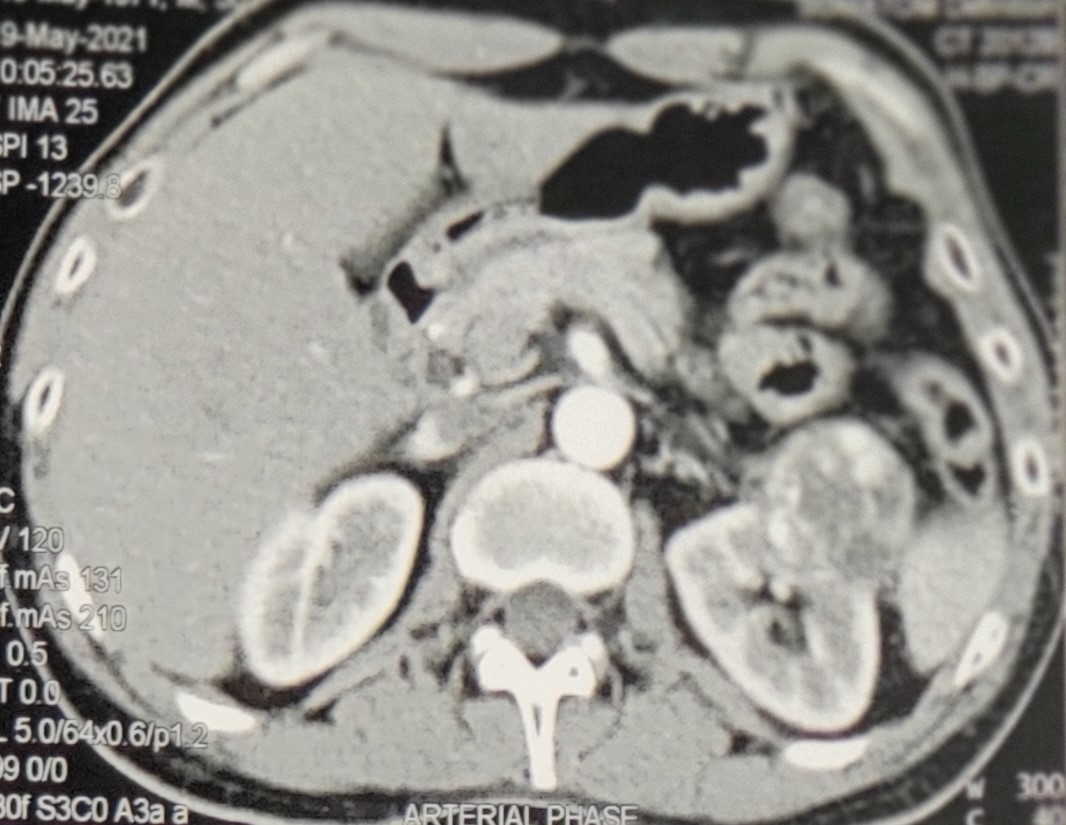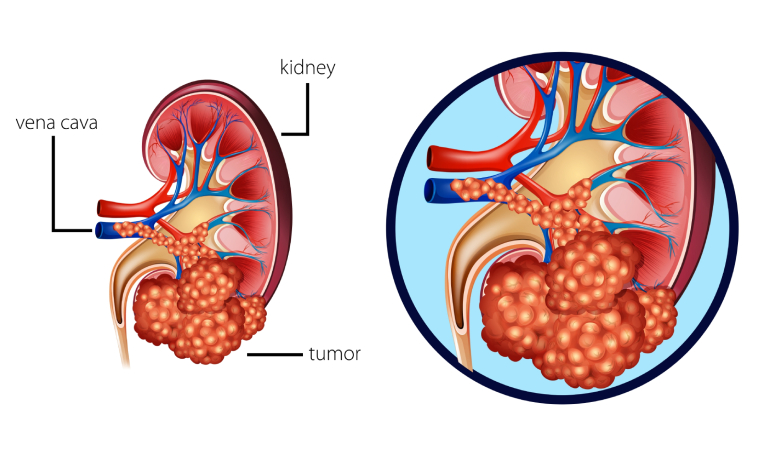Best Doctor for Kidney Cancer Treatment in Vashi, Navi Mumbai
Kidney Cancer : Types, Symptoms, Diagnosis & Treatment

CT-Scan of Kidney Cancer
Dr. Varun Agarwal provides a personalized, effective treatment and Robotic Surgery for kidney cancer in Vashi, Navi Mumbai.
What Is Kidney Cancer?
Kidney cancer is also often referred to as renal cancer, primarily affects adults and typically manifests as renal cell carcinoma (RCC), the most prevalent form of kidney cancer. If left untreated, kidney cancer can progress and spread to other parts of the body.
Kidney cancer can metastasize, meaning cancer cells can spread through the different parts like the lymph nodes and blood vessels to distant sites in the body, such as the lungs, bones, or liver, forming new tumors in these areas.

-
Renal Cell Carcinoma (RCC): - RCC, originating in the small tubes that transport urine within the kidneys, is the most common type of kidney cancer among adults.
most common type of kidney cancer among adults.
-
Transitional Cell Carcinoma (TCC): - Transitional Cell Carcinoma, also called as urothelial carcinoma, is a rarer form of kidney cancer. It initiates in the urothelial cells lining the bladder but can affect the ureters and kidneys.
Stages of Kidney Cancer
Upon a kidney cancer diagnosis, your healthcare provider will assess the stage of the disease, classifying it based on its extent within the body and the presence of any metastasis.
Staging aids in devising the most appropriate treatment strategy.
- Stage 1 : The tumor measures 7 cm (2.75 inches) or smaller and is confined to the kidney.
- Stage 2 : Here, the tumor is larger than 7 cm and remains within the kidney.
- Stage 3 : The tumor, irrespective of size, has spread to nearby lymph nodes or adjacent blood vessels.
- Stage 4: The tumor has invaded the outer kidney layer, or cancer cells have disseminated to the lungs, the liver, bones, lymph nodes, or other tissues.
Symptoms and Risk Factors for Kidney Cancer
Various cancers are associated with distinct risk factors. Some factors, such as age and family history, cannot be modified, while others, like smoking cessation, are within our control. The presence of one or more risk factors doesn't necessarily guarantee the development of kidney cancer, as many individuals with the disease may have minimal or no identifiable risk factors.
If you experience symptoms such as hematuria or persistent back pain, it's crucial to promptly consult a healthcare professional for evaluation.
Common Symptoms of Kidney Cancer Include:
-
Hematuria (blood in the urine, which may appear rusty in color). -
Persistent side pain. -
A palpable lump or mass in the side or abdomen. -
Unexplained weight loss. -
Fever. Chronic fatigue.
If you experience symptoms such as hematuria or persistent back pain, it's crucial to promptly consult a healthcare professional for evaluation.
Key Risk Factors for Kidney Cancer :
- Smoking :
Long-term smokers face an elevated risk of kidney cancer. - Obesity :
Excess body weight is linked to an increased risk of kidney cancer and other health conditions. - High Blood Pressure :
Individuals with hypertension may have a higher risk. - Family History :
A family history of kidney cancer, especially in the presence of inherited conditions like Von Hippel-Lindau syndrome, can slightly increase the risk. - Occupational Exposure :
Certain industrial substances, including cadmium and organic solvents, are associated with a potential risk of kidney cancer.
Diagnosing Kidney Cancer
Dr. Varun Agarwal, with his team, employs advanced techniques to diagnose and treat kidney cancer. We offer personalized, focused care, relying on specialist expertise to help you make informed decisions. A comprehensive medical history and a thorough physical examination are considered to reach a precise cancer diagnosis. This process involves questions about your symptoms and pertinent health information.
Diagnostic Tests for Kidney Cancer May Include :
- Urine Tests:
These lab tests analyze urine for signs of blood, cancer cells, or other disease markers. - Blood Tests:
Blood analysis includes evaluating substances like creatinine, which can indicate kidney function. - Ultrasound:
This imaging method generates pictures of the kidney and surrounding tissues, assisting in identifying kidney tumors. - CT Scan:
Employing X-ray technology and computerized imaging, CT scans reveal kidney cancer within the kidneys, lymph nodes, or abdominal tissues. - MRI:
Magnetic resonance imaging produces detailed images, allowing to visualize kidney cancer and affected areas, even in smaller organs like the kidneys and lymph nodes. - Biopsy:
A sample of kidney tissue is collected to detect the presence of cancer cells.
Treating Kidney Cancer
Surgery represents the most common treatment approach for kidney cancer. When a kidney is removed, the remaining kidney must perform the work of both kidneys, necessitating proper diet and nutrition to ease the burden on the remaining organ. In cases of inadequate kidney function, dialysis may be required, while some individuals might become candidates for kidney transplantation.
Treatment Options for Kidney Cancer Include :
- Radical Nephrectomy:
This procedure removes the affected kidney, often including the adrenal gland and nearby lymph nodes. - Partial Nephrectomy:
The choice between partial and radical nephrectomy is determined by the tumor's location and grade. In a partial nephrectomy, only the tumor and the surrounding kidney tissue are removed, and it can be performed through either a large incision or minimally invasive laparoscopic surgery. Robotic surgery, conducted with the da Vinci Surgical System, is a preferred method, reducing hospitalization time and facilitating a faster recovery. - Cryosurgery: T
This technique involves freezing and killing the kidney tumor using a specialized tool inserted through a small incision. - Radiation Therapy:
While kidney cancers are relatively resistant to radiation, radiation therapy may be used to alleviate symptoms such as pain or bleeding caused by cancer spread. - Targeted Therapy:
For individuals with kidney cancer that has metastasized, targeted therapy drugs are administered to shrink tumors or slow their growth. These medications are typically taken orally. - Chemotherapy:
Kidney cancer generally tolerates chemotherapy, making it a less common treatment choice. - Biological Therapy:
Also known as immunotherapy, is administered to slow tumor growth or reduce tumor size. This treatment is typically given intravenously or subcutaneously for individuals with metastatic kidney cancer.
Preventing Kidney Cancer
To mitigate the risk of kidney cancer, consider the following recommendations:
- Quit Smoking :
The majority of kidney cancer cases are associated with smoking. Quitting tobacco can reduce the risk. - Manage Optimal Body Weight :
Obesity and high blood pressure increase the likelihood of kidney cancer. Adopt a healthy lifestyle and manage your weight effectively. - Minimize Exposure to Harmful Substances :
Occupational exposure to harmful substances like cadmium and industrial chemicals may elevate the risk of kidney cancer. Employ protective measures in such environments whenever possible.
Meet our Uro-Oncologist and Robotic Surgeon






